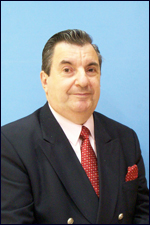2005 Nobel Peace Prize winner to speak at OSU Research Week
Thursday, February 15, 2007

Abel Julio González, senior advisor, Nuclear Regulatory Authority, Argentine Government,
will give a public lecture on “The International Atomic Energy Agency: The Nobel Peace
Prize 2005” on Thursday, Feb. 22, at 7:30 p.m. in the Student Union Little Theatre.
González will speak during OSU Research Week scheduled for Feb. 19-23, 2007.
For over two decades, González was director of Radiation Safety at the International
Atomic Energy Agency, the United Nations’ nuclear watchdog. As a senior officer, he
shared the Nobel Peace Prize awarded to the Agency in 2005 for their efforts to prevent
nuclear energy from being used for military purposes and to ensure that nuclear energy
for peaceful purposes is used in the safest possible way.
González is an expert in radiation protection, i.e., protecting people and their habitat
against the detrimental effects of ionizing radiation and the safety and security
of radiation sources. He is a member of the United Nations Scientific Committee on
the Effects of Atomic Radiation, an apolitical technical body reporting to the United
Nations General Assembly, which estimates the global levels and effects of exposure
to ionizing radiation.
He is commissioner of the International Commission on Radiological Protection, a nonprofit
academic charity founded in 1928 by the International Congress of Radiology, which
issues global recommendations on radiological protection; vice-president of the International
Radiation.
Protection Association assembles and represents radiation protection professionals
worldwide and is a member of the IAEA’s Commission of Safety Standards, which establishes
international standards on nuclear, radiation, waste and transport safety.
González will give a technical lecture, “2006 Scientific Progress in Radiation Protection:
Protecting People and Their Habitat Against Atomic Radiation,” on Friday, Feb. 23
at 2 p.m. in Room 106, Noble Research Center.
González will speak about United Nations estimates on the health effects of radiation
exposure from a report by the United Nations Committee on the Effect of Atomic Radiation;
the latest recommendations on radiation protection from the International Commission
on Radiological Protection; developments in the protection of patients in radio-diagnosis
and radio-therapy and outcomes from recent international conferences; a global assessment
of the effects of the Chernobyl accident with results from the Chernobyl Forum; and
protection against a terrorist attack with radioactive substances which includes current
ICRP recommendations on terrorism.
